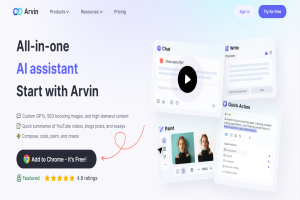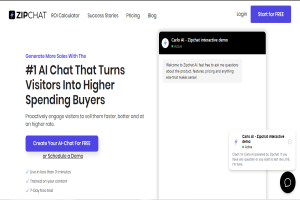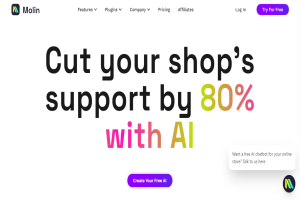Tool List
Top AI Tools for Assistant Chatbots
AI tools for Assistant Chatbots empower businesses to create intelligent chatbots for seamless customer interactions. These tools enhance customer support, sales, and engagement by providing instant responses and personalized experiences. With benefits like 24/7 availability, scalability, and cost-efficiency, Assistant Chatbot tools revolutionize customer service. The cost of AI tools for Assistant Chatbot varies based on features and complexity, ranging from $25 to $500. Using AI tools for Assistant Chatbot ensures efficient customer interactions, enabling businesses to improve customer satisfaction and loyalty while reducing operational costs.

Getmanifest
Manifest AI chatbot helps shoppers find what they need & convert faster, and that too with a human-like touch

Airfocus
Product management made easy with a flexible platform that helps you manage strategy, understand user needs, prioritize...

Taskade
Easily create, train, and deploy AI agents tailored to your specific workflow needs. From managing tasks to automating r...

Arvin Chat
💬 Custom GPTs, SEO boosting images, and high-demand content 📝 Quick summaries of YouTube videos, blogs posts, and e...

Must AI
Your key to effortlessly crafting high-quality text in an instant. Our user-friendly interface and robust features make...

Upsyshopping
Upsy uses sophisticated AI algorithms to understand customers’ behavior and your webshop’s products. This allows Upsy to...

Zipchat
Proactively engage visitors to sell them faster, better and at an higher rate.

Molin
Using advanced AI language models, Molin solves complex problems and provides more accurate answers than any AI chatbot...

Hellorep
Convert up to 3x more site traffic and handle up to 97% of your support requests — with an AI that stays true to your br...

Tile desk
Automate conversations from prototyping to Web, Whatsapp, Facebook and more in minutes
Frequently Asked Questions
An assistant chatbot is an AI-driven tool designed to assist users by answering questions, providing information, and completing tasks through conversational interfaces such as messaging apps or voice assistants.
AI enhances assistant chatbots by enabling them to understand natural language, learn from interactions, and provide personalized responses, which makes them more efficient and user-friendly.
Yes, assistant chatbots can be integrated with various business systems such as CRM software, databases, and scheduling tools to streamline operations and provide tailored services.
Key features include natural language processing, machine learning, task automation, user authentication, and integration capabilities with external APIs and services.
Assistant chatbots use natural language processing (NLP) to parse and understand user inputs, extracting relevant information and intent to generate appropriate responses.
Yes, many AI-powered assistant chatbots are capable of understanding and responding in multiple languages, making them suitable for global applications.
Industries such as healthcare, finance, customer service, e-commerce, and hospitality greatly benefit from assistant chatbots due to their ability to automate routine inquiries and transactions.
Security in AI assistant chatbots is paramount, and reputable platforms employ encryption, user authentication, and compliance with data protection regulations to secure user data.
While assistant chatbots can handle many standard inquiries and tasks, complex issues and sensitive customer service situations still require human intervention.
Training involves feeding the chatbot examples of various interactions and refining its models based on feedback. Continuous learning from real interactions is essential for improving accuracy and relevance.
Sentiment analysis allows chatbots to assess the emotional tone of user messages, enabling them to respond appropriately to the user’s mood and potentially escalate issues to human agents if necessary.
Assistant chatbots can track user preferences, past interactions, and context to tailor conversations and recommendations, enhancing the user experience.
Advanced assistant chatbots can make certain decisions based on predefined rules and machine learning models, especially in scenarios like booking appointments or suggesting products.
Challenges include understanding diverse linguistic nuances, managing user expectations, ensuring privacy and security, and integrating seamlessly with existing systems.
Future developments include more sophisticated contextual understanding, proactive interaction capabilities, and deeper integration with IoT devices and other smart technologies, expanding their usability and effectiveness.
Frequently Asked Questions
Q: What is an assistant chatbot?
A: An assistant chatbot is an AI-driven tool designed to assist users by answering questions, providing information, and completing tasks through conversational interfaces such as messaging apps or voice assistants.
Q: How do AI tools enhance assistant chatbots?
A: AI enhances assistant chatbots by enabling them to understand natural language, learn from interactions, and provide personalized responses, which makes them more efficient and user-friendly.
Q: Can assistant chatbots be integrated with business systems?
A: Yes, assistant chatbots can be integrated with various business systems such as CRM software, databases, and scheduling tools to streamline operations and provide tailored services.
Q: What are the main features of AI-driven assistant chatbots?
A: Key features include natural language processing, machine learning, task automation, user authentication, and integration capabilities with external APIs and services.
Q: How do assistant chatbots understand user requests?
A: Assistant chatbots use natural language processing (NLP) to parse and understand user inputs, extracting relevant information and intent to generate appropriate responses.
Q: Can assistant chatbots handle multiple languages?
A: Yes, many AI-powered assistant chatbots are capable of understanding and responding in multiple languages, making them suitable for global applications.
Q: Are there specific industries that benefit from assistant chatbots?
A: Industries such as healthcare, finance, customer service, e-commerce, and hospitality greatly benefit from assistant chatbots due to their ability to automate routine inquiries and transactions.
Q: How secure are AI assistant chatbots?
A: Security in AI assistant chatbots is paramount, and reputable platforms employ encryption, user authentication, and compliance with data protection regulations to secure user data.
Q: Can assistant chatbots replace human customer service agents?
A: While assistant chatbots can handle many standard inquiries and tasks, complex issues and sensitive customer service situations still require human intervention.
Q: How can I train an assistant chatbot to perform better?
A: Training involves feeding the chatbot examples of various interactions and refining its models based on feedback. Continuous learning from real interactions is essential for improving accuracy and relevance.
Q: What is sentiment analysis in assistant chatbots?
A: Sentiment analysis allows chatbots to assess the emotional tone of user messages, enabling them to respond appropriately to the user’s mood and potentially escalate issues to human agents if necessary.
Q: How do assistant chatbots personalize user interactions?
A: Assistant chatbots can track user preferences, past interactions, and context to tailor conversations and recommendations, enhancing the user experience.
Q: Can assistant chatbots make decisions on their own?
A: Advanced assistant chatbots can make certain decisions based on predefined rules and machine learning models, especially in scenarios like booking appointments or suggesting products.
Q: What are the challenges in developing assistant chatbots?
A: Challenges include understanding diverse linguistic nuances, managing user expectations, ensuring privacy and security, and integrating seamlessly with existing systems.
Q: What future developments are expected in AI assistant chatbots?
A: Future developments include more sophisticated contextual understanding, proactive interaction capabilities, and deeper integration with IoT devices and other smart technologies, expanding their usability and effectiveness.
Frequently Asked Questions
Q: What is an assistant chatbot?
A: An assistant chatbot is an AI-driven tool designed to assist users by answering questions, providing information, and completing tasks through conversational interfaces such as messaging apps or voice assistants.
Q: How do AI tools enhance assistant chatbots?
A: AI enhances assistant chatbots by enabling them to understand natural language, learn from interactions, and provide personalized responses, which makes them more efficient and user-friendly.
Q: Can assistant chatbots be integrated with business systems?
A: Yes, assistant chatbots can be integrated with various business systems such as CRM software, databases, and scheduling tools to streamline operations and provide tailored services.
Q: What are the main features of AI-driven assistant chatbots?
A: Key features include natural language processing, machine learning, task automation, user authentication, and integration capabilities with external APIs and services.
Q: How do assistant chatbots understand user requests?
A: Assistant chatbots use natural language processing (NLP) to parse and understand user inputs, extracting relevant information and intent to generate appropriate responses.
Q: Can assistant chatbots handle multiple languages?
A: Yes, many AI-powered assistant chatbots are capable of understanding and responding in multiple languages, making them suitable for global applications.
Q: Are there specific industries that benefit from assistant chatbots?
A: Industries such as healthcare, finance, customer service, e-commerce, and hospitality greatly benefit from assistant chatbots due to their ability to automate routine inquiries and transactions.
Q: How secure are AI assistant chatbots?
A: Security in AI assistant chatbots is paramount, and reputable platforms employ encryption, user authentication, and compliance with data protection regulations to secure user data.
Q: Can assistant chatbots replace human customer service agents?
A: While assistant chatbots can handle many standard inquiries and tasks, complex issues and sensitive customer service situations still require human intervention.
Q: How can I train an assistant chatbot to perform better?
A: Training involves feeding the chatbot examples of various interactions and refining its models based on feedback. Continuous learning from real interactions is essential for improving accuracy and relevance.
Q: What is sentiment analysis in assistant chatbots?
A: Sentiment analysis allows chatbots to assess the emotional tone of user messages, enabling them to respond appropriately to the user’s mood and potentially escalate issues to human agents if necessary.
Q: How do assistant chatbots personalize user interactions?
A: Assistant chatbots can track user preferences, past interactions, and context to tailor conversations and recommendations, enhancing the user experience.
Q: Can assistant chatbots make decisions on their own?
A: Advanced assistant chatbots can make certain decisions based on predefined rules and machine learning models, especially in scenarios like booking appointments or suggesting products.
Q: What are the challenges in developing assistant chatbots?
A: Challenges include understanding diverse linguistic nuances, managing user expectations, ensuring privacy and security, and integrating seamlessly with existing systems.
Q: What future developments are expected in AI assistant chatbots?
A: Future developments include more sophisticated contextual understanding, proactive interaction capabilities, and deeper integration with IoT devices and other smart technologies, expanding their usability and effectiveness.